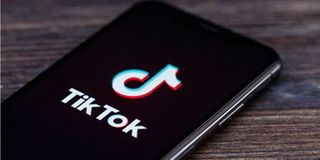
TikTok logo.
Tik. Tok. Tik. Tok.
That is not a clock ticking. It is a representation of how a generation of Kenyans is warming up to social media platforms like TikTok and craving TikTok-type fame, yearning for celebrity status and dreaming of the good life through being influencers.
A ticking time bomb? Some may say so; but for Generation Z (Gen Z) Kenyans, this is a madness with a method to it.
According to a report to be released Wednesday, the number of Gen Z Kenyans who desire to be doctors is equal to those who are dreaming of becoming social media influencers. The highest number of them (22 per cent) want to be self-employed through their own businesses. Doctor and influencer (12 per cent) tie at second place.
Behold, a career that never existed when the 21st century began is now tied in attractiveness with a profession that has been around since at least 3000 BC. Some may say this is a revolution that will not be televised, though it may feature in Gen Z persons’ statuses and shorts; in “instagrammable” format no less.
The study was done by Odipo Dev and Africa Uncensored. The resultant report is titled “Fame, Fortune, Freedom: Decoding the Shape of the Dream for Kenya’s Gen Z”.
Ms Patricia Andago, the research director at Odipo Dev, said the shift in the attractiveness of some careers is informed by the current trends, some that have caused the ongoing doctors’ strike.
“They are witnessing the success of influencers. They are seeing people their age, in their class, making money. They are seeing influencers moving to the States, (like) Elsa Majimbo, and buying real estate in the States. So, careers like influencing are looking more attractive than the traditional careers. There is a time where you ask young people what they want to be and a majority would say ‘a doctor’. But now it’s only 12 per cent saying ‘doctor’. That is likely to keep going down if the doctors continue having the struggles they are having,” Ms Andago told Nation.
Mr Norbert Mburu, the head of culture at Odipo Dev, added that the influencer role represents many things that Kenya’s young desire.
“Of the things that would be very ideal for them in a job, influencer is ticking a lot of boxes,” he said, adding that the internet is among the biggest informers of the choices the Gen Z are making
Gen Z is defined as the generation born between 1997 and 2012. To come up with the findings, 1,300 Kenyans aged 18 to 27 from various regions were asked a number of questions, among them: “Do you think being an influencer is a reputable career?”
A whopping 78 per cent said “yes”, while the minority applied to the contrary.
The other question was, “Do you believe it’s possible to make a decent living as an influencer?” An overwhelming majority, 76 per cent of them, replied to the affirmative.
One of the young influencers on the top of their game in Kenya is Azziad Nasenya, who shot to fame in 2020 by dancing on TikTok and has since been dancing all the way to the bank through engagements with various brands. Young Kenyans want to live a life like hers where everything looks glamorous and fun — though she has said a couple of times that it is not all glam.
Tik. Tok. Tik. Tok.
The longest arm on the clock does one revolution per minute, but this generation of ambitious and tech-savvy Kenyans wishes could move faster when it comes to money. Asked about their top considerations for choosing a job, 67 per cent chose money. The second highest consideration, of 33 per cent, was mental health while the third was “vibes”.
Are you an employer whose workplace doesn’t have the right vibes? They might Tik-Tok their way into exposing you as they walk out on you.
The number of Gen Zs who chose “vibes” (19 per cent) was equal to those who said company reputation informs their choice of employer. Twelve per cent said they would be attracted to an employer who values remote work.
On Twitter and other social media platforms, Gen Zs have often been a subject of conversations, with observers often saying how they struggle with the attitude of this generation.
Still on money, the respondents were asked to discuss the notion that money is fine, whatever way it is obtained.
The lion’s share, 34 per cent, were for obtaining money in legal and moral ways. However, a staggering 23 per cent, or 299 of the sample, said making money is admirable “regardless of how it is done”.
Nineteen percent answered “yes” to the statement that “I don’t judge anyone who earns money illegally, but I wouldn’t”.
The study also showed that patriotism is the least of the attributes the Gen Z would like to espouse. Only 16 per cent of the interviewees said they can’t ditch Kenya for another country. For those who would like to explore other countries, 39 per cent wish to go to America, 31 per cent to Europe, Australia (17 per cent), another part of Africa (12 per cent), another country in East Africa (10 per cent) and Asia (nine per cent).
The study incorporated youth in urban and rural areas. Twenty-five per cent of the respondents were from the Rift Valley region, 10 per cent from Western, Nyanza (13 per cent), North Eastern (5 per cent), Nairobi (11 per cent), Eastern (15 per cent), Coast: (9 per cent) and Central (13 per cent). Fifty-one percent were female while 49 per cent were male.
“We’ve been trying to understand generational assessments for a long time. For a long time, it was millennials. We took quite a bit of time and effort just understanding how millennials socialise. Now this time, the focus in terms of generations is Gen Z,” said Ms Andago.
“One of the things that we are always discussing when it comes to comparing generations is the shape of the dream; how the shape of the dream changes based on the environment that they have, based on the developments that have been happening; whether it’s in the media, whether it’s in environment, in the country,” she added.
Tik. Tok. Tik. Tok. The quest for things that tick the boxes of the generation entering its prime is sure to cause disruptions. Like one of the trending arbantone (yes, that’s a music genre) songs says: “TikToker, anapenda TikToker.” This is the era of TikTokers.











